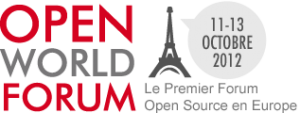Open Forges Summit 2012: Presentations and Take-aways
 The Open World Forum is the best place to meet and talk about the present and the future of open source forges, as seen back in 2010 at the first Open Forges Summit, and again in 2011 to talk about interoperability among forges.
The Open World Forum is the best place to meet and talk about the present and the future of open source forges, as seen back in 2010 at the first Open Forges Summit, and again in 2011 to talk about interoperability among forges.
As Track Chair of the Open Forges Summit 2012 I’ve been in the position to invite few international speakers to bring their opinions and views, and we actually put together an amazing gathering of people sharing the same passion, read below to know more about it.
Before introducing all the speakers I briefly mentioned SourceForge’s open source strategy regarding Allura (coverage), the fully open source platform backing SourceForge, now incubated at the Apache Software Foundation. Doing so we didn’t give away our ‘crown jewels’, we just strengthen our position by welcoming others to innovate, yet giving our communities more control over of their projects.
Ross Gardler – Apache Software Foundation board member, OpenDirective Founder and one of Allura’s mentors – shared with the audience his understanding about what forges are and what are they aimed for. In his own words:
Building open source software is about social interaction and the good governance of those interactions. It is not about providing better forge tools and it is certainly not about trying to make forges full of tools that encourage a community to fracture rather than collaborate. In my opinion the focus should be on people not tools.
His speech was really enlightening, and I very much appreciated his positive feedback about the first step the Apache Allura podling is moving at the ASF. Ross pointed us also to a project called simal focused on harvesting data about projects (using DOAP) and making it available to query. Described as follows:
No stats, no tools, no magic hammers, just pointers to resources and people and their social graphs within project communities.
Last but not least after his talk we spent some time discussing about forge, and among audience’s input it worth to mention Karl Fogel’s book on “Producing Open Source” and “Open Advice” Edited by Lydia Pintscher.
Read more at the SourceForge blog.

Links 21/11/2012: GNU/Linux Preinstalled on More Systems, Linux Rootkit Claimed | Techrights 3:36 am on November 21, 2012 Permalink
[…] Open Forges Summit 2012: Presentations and Take-aways The Open World Forum is the best place to meet and talk about the present and the future of open source forges, as seen back in 2010 at the first Open Forges Summit, and again in 2011 to talk about interoperability among forges. […]